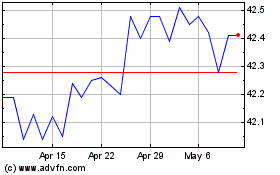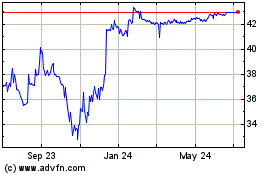DOJ Says Three Generic Drug Companies Resolve Price-Fixing Allegations
October 01 2021 - 1:43PM
Dow Jones News
By Michael Dabaie
The U.S. Justice Department said three generic pharmaceutical
manufacturers agreed to pay civil settlements to resolve alleged
False Claims Act violations in connection with conspiracies to fix
the price of various generic drugs.
The DOJ said Taro Pharmaceuticals USA Inc., Sandoz Inc. and
Apotex Corp. agreed to pay a total of $447.2 million.
The Justice Department said these conspiracies allegedly
resulted in higher drug prices for federal healthcare programs and
beneficiaries according.
The government alleged that between 2013 and 2015, all three
companies paid and received compensation prohibited by the
Anti-Kickback Statute through arrangements on price, supply and
allocation of customers with other pharmaceutical manufacturers for
some generic drugs manufactured by the companies.
Taro Pharmaceuticals USA agreed to pay $213.2 million, the DOJ
said. The Taro drugs allegedly implicated address a variety of
health conditions, and include etodolac, a nonsteroidal
anti-inflammatory drug used to treat pain and arthritis, and
nystatin-triamcinolone cream and ointment, a combination of an
antifungal medicine and steroid used to treat certain kinds of skin
infections, DOJ said.
Sandoz agreed to pay $185 million. The Sandoz drugs at issue
include benazepril HCTZ, used to treat hypertension, and
clobetasol, a corticosteroid used to treat skin conditions, the
Justice Department said.
Apotex agreed to pay $49 million in connection with its sale of
pravastatin, a drug used to treat high cholesterol and triglyceride
levels, the DOJ said.
Novartis division Sandoz said the settlement is an expected
outcome of the resolution the company reached in March 2020 with
the DOJ Antitrust Division. "Today's settlement contains no new
factual allegations against Sandoz, and the company fully
provisioned for this settlement and disclosed the agreement in
principle as part of the March 2020 resolution," the company
said.
"As recognized by the DOJ, Sandoz cooperated with the
government's investigation. The conduct at issue here occurred at
Sandoz from March 2013 through December 2015 in direct
contravention of the company's values, policies and trainings in
place at the time. The individuals implicated in the underlying
conduct are no longer employed by the company," Sandoz said.
Taro said in July 2020 that it resolved DOJ antitrust
investigations. Taro said in a July 2020 statement that it resolved
all cases involving the company in connection with the multi-year
investigations by the DOJ into the U.S. generic pharmaceutical
industry.
"We are happy to have reached this global resolution with the
DOJ," Taro Chief Executive Uday Baldota said in the July 2020
release. "Taro is committed to the highest level of ethics and
integrity and we will continue to fully cooperate with the
government on its ongoing investigation into the generic
pharmaceutical industry."
DOJ said Friday that in connection with its settlement
agreement, each company entered a five-year corporate integrity
agreement. The CIAs include internal monitoring and price
transparency provisions. They also require the companies to
implement compliance measures including risk assessment programs,
executive recoupment provisions and compliance-related
certifications from company executives and board members, the DOJ
said.
Write to Michael Dabaie at michael.dabaie@wsj.com
(END) Dow Jones Newswires
October 01, 2021 13:28 ET (17:28 GMT)
Copyright (c) 2021 Dow Jones & Company, Inc.
Taro Pharmaceutical Indu... (NYSE:TARO)
Historical Stock Chart
From Nov 2024 to Dec 2024

Taro Pharmaceutical Indu... (NYSE:TARO)
Historical Stock Chart
From Dec 2023 to Dec 2024
